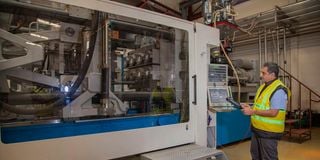Silafrica Company: From a retail shop to a manfacturing powerhouse

Silafrica Executive Director Akshay Shah during the interview on September 29, 2022 in industrial area, Nairobi. The company manufactures and distributes packaging materials to businesses dealing with food, beverages, cosmetics, pharmaceuticals and chemicals.
For more than four decades, Silafrica has been the leading player in the Fast Moving Consumer Goods (FMCG) packaging business in East Africa.
The company manufactures and distributes packaging materials to businesses dealing with food, beverages, cosmetics, pharmaceuticals and chemicals.
Silafrica Executive Director, Akshay Shah, attribute the company’s success to lessons gained through its steady retail family business to the leading FMCGs manufacturing business in Tanzania. It also serves markets in Kenya, Ethiopia, Nigeria and Uganda.
In Nigeria the company worked with the multinational company Coca Cola but then the business environment shifted to hostile and the company there had to close down.
In Uganda the political environment made it difficult to run a business and ultimately that was closed down too.
These challenges however brought about knowledge and the lessons acquired have been useful in the business.

Some of the finished products at Silaafrica Company.
“Our first company was in Tanzania and throughout our growth journey, we’ve established companies in different countries including the UAE and most recently Ethiopia,” says Akshay as he shares challenges the company has faced executing its growth strategy.
In the UAE, the company had established a special additive manufacturing factory that would make it possible to use less material in production without compromising the structural properties of packaging.
It however ended up being one of the victims of the global financial crisis between 2007 and 2008.
In Ethiopia however, the business is flourishing and he describes the business environment there to be favourable and recommends it to companies seeking to expand their markets.
The company works with more than 80 other companies in Kenya to provide packaging solutions with 75 per cent of these being Small and Medium Enterprises (SMEs).
“Silafrica started off as an SME and we, therefore, understand the process of scaling up in a business.” According to Akshay, the biggest bottleneck to growth is lack of capability.
“SMEs need to build capacity to achieve growth. We work with many SMEs to offer them affordable solutions in affordable quantities to build their capability within their budget.”
One of the major areas the company is working with SMEs is the agricultural sector.
He notes that with food security being a global concern and part of the Sustainable Development Goals (SDG), one of the immediate fixes that also brings more value to SMEs in the agricultural sector is ensuring minimal wastage during the handling and transit of agricultural produce.
“With billions of dollars removed from the global economy annually due to damaged food, and 40 per cent of this happening during handling and transit, minimising this will not only lead to more revenues for SMEs involved but more importantly help feed 1.6 billion more people globally.”
Locally, Silafrica works with farmers’ organisations to innovate and manufacture two types of crates; nestable and stackable crates.
These crates are designed in a way that the products packed in are protected from damage resulting in higher quantities reaching the market and consequently more revenue to the SMEs.
“These crates are traceable, which is an important factor enabling monitoring the supply chain and curbing the writing-off of the assets due to misplacements.”
The crates are made from recycled plastic to promote circular economy in alignment with SDG 12 - Responsible Consumption and Production.
“Besides our focus on innovation and growth, we are keen on recycling and reusing our packaging materials.”
Silaafrica also works with SMEs in the dairy industry, which has enabled access to affordable yoghurt packaging cups.
By being the first company in Africa to acquire in-mould labelling technology, the latest tech in packaging, SMEs can get the packaging of the same quality as multinational corporations at affordable rates which is key to getting shelf appeal and inevitable growth.

An employee stacks some of the finished products at Silafrica Company.
“Startups and SMEs have been enabled to compete fairly by leveraging these packaging and achieve positive year-to-year growth ratios.”
While giving tips on how to scale up in business, one should be open to increasing their knowledge through reading. Talking to other entrepreneurs and learning from their experiences helps in growing.
“Over the years, our company has been growing and at one point we too were a SME. Learning from other businesses already in the growth level has been instrumental for our growth.”
Ashka points out the Entrepreneurs Organisation (EO) as a resourceful organisation SME owners or founders can join to learn more from people sharing similar interests in business.
The organisations are in different categories which are based on the annual returns of a business.
“For example, college students with business making above Sh100,000 annual revenues can join under the EO Accelerator Programme and get tested insights from business leaders.”
In the export sector, the company has worked with the Avocado Society of Kenya to innovate and manufacture foldable crates.
The crates make shipping cheaper as space requirements are greatly reduced in return journeys.
This is as the export market remains one of the most untapped market bases by Kenyan Companies.
“Exporting products to bigger markets like China and India, which contribute to more than 30 percent of global consumption, would be a game changer.”
Reusing packaging materials ensures less environmental pollution since it also allows a return of broken crates. The broken plastic materials are crushed and used in making new packaging commodities.
“The export crates, whose cost is similar to the widely used carton packaging, are designed to be foldable to make returning cheap and therefore allow multiple reuse making the cost of packaging a one-off expense.”
This ultimately lowers the operating costs allowing the company to be competitive in price in the foreign markets.
Ashkay adds that “For growth, it’s highly imperative that decisions and strategies are guided by two principles; improving cash flow and increasing business valuation, everything else is secondary.”





